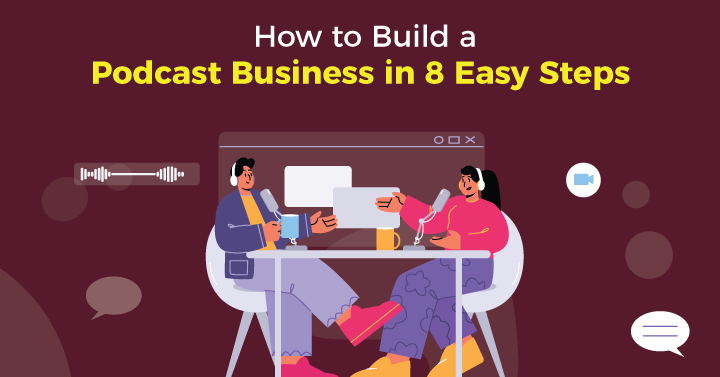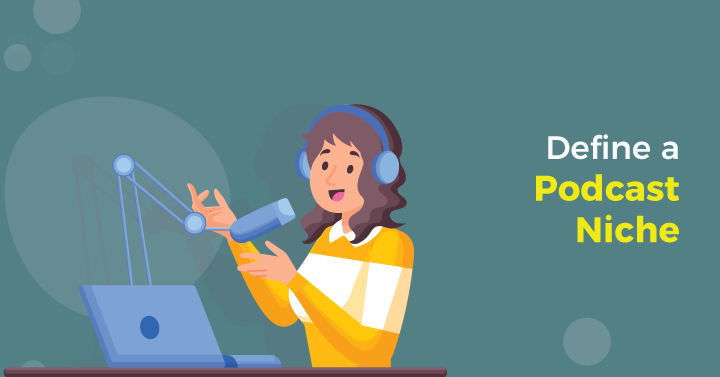
- What Is a Podcast Business?
- What Are the Best Podcast Business Models?
- 8 Steps on How to Build a Podcast Business
- FAQs
If you’re passionate about a topic or have a unique perspective to share, knowing how to build a podcast business is the first step. But with so many podcasts out there, how do you make your show stand out and turn it into a successful stint?
In this guide, we’ll show you how to build a podcast business with some practical tips and strategies from scratch. So, if you’re ready to turn your passion for podcasting into a thriving business, let’s dive in.
1. What Is a Podcast Business?
A podcast business involves creating and producing audio content on a specific topic or audience and monetizing that content through various means, such as sponsorships, merchandise sales, and paid subscriptions. If you have a unique perspective or expertise on a subject, then starting a podcast business could be a great way to share your insights with the world and build a loyal following of listeners. For instance, if you are interested in journalism, you can start a podcast business focusing on news and current events.
2. What Are the Best Podcast Business Models?
- Direct Sales
Direct sales involve charging listeners for access to exclusive content or merchandise. This model can be particularly effective for podcasts with a loyal following, as fans are often willing to pay for additional perks and benefits. Direct sales may be a great way to monetize your content and build a sustainable podcast business, especially if you are an expert in a niche.
- Indirect sales
Indirect sales involve using your podcast as a marketing tool to promote other products or services you offer. For example, if you run a coaching business or offer online courses, your podcast could serve as a way to attract new clients and customers. This business model can be especially effective for service-based businesses looking to expand their reach and build brand awareness.
- Listener-supported
Listener-supported models rely on donations or subscriptions from loyal fans. This can be a Patreon account, where listeners can make monthly donations to support your work or a subscription service that provides exclusive content. If you have a passionate following that wants to support your work, this model can be a great way to generate a steady income stream.
- Ad-supported
Ad-supported models involve partnering with sponsors to promote products or services to your audience. This can be a brief ad at the beginning or end of your podcast or advertisements integrated seamlessly into your content. Ad-supported models can be particularly lucrative for podcasts with a large and engaged audience, as sponsors are often willing to pay top dollar for access to your listeners.
3. 8 Steps on How to Build a Podcast Business
3.1 Define a Podcast Niche

3.1.1 Identify Your Audience
How to build a podcast business involves identifying your target audience, creating engaging content, promoting your show through various channels, and monetizing your podcast through sponsorships, ads, or merchandise.It is a smart strategy that can help ensure your podcast will have a ready audience when it launches. You can do this by contacting other podcasters in your niche, collaborating with them, and attending relevant events and conferences. You should first determine who your target audience is and what they are interested in. This will help you create content that resonates with them and makes them want to listen to your podcast.
3.1.2 Brainstorm the Topics
When it comes to podcasting, you must talk about topics you are passionate about. This will make it easier for you to create high-quality content, and your audience will be able to hear the enthusiasm in your voice. For example, if you want to start a podcast about fitness, you can narrow it down to a specific type of fitness, such as weightlifting, yoga, or running. The more detailed your niche, the easier it will be for you to build a dedicated audience.
3.1.3 Consider the Competition
Before you start working on your podcast, it’s essential to research your competition. First, evaluate what the existing podcasts in your niche are doing well and where they fall short. You can use this information to identify opportunities to differentiate your podcast. Next, look for areas where the existing podcasts in your niche are lacking. It could be a topic that isn’t being covered or a particular angle that hasn’t been explored. Consider how your experiences and expertise can bring a unique perspective to your potential podcast niche.
3.2 Develop a Business Plan
3.2.1 Determine Your Reason for Podcasting
To turn your podcast into a business, you need to have a solid business plan. You should first determine the reason for podcasting by asking questions like – Why do you want to start a podcast business? Is it to share your knowledge with others, or do you want to turn your passion into a career? Then, you must define your reason for podcasting to stay motivated and focused as you work to grow your business. You can download a podcast business plan PDF online to outline your business model.
3.2.2 Develop Editorial Calendar
An editorial calendar is a plan that outlines the content you will create for your podcast. This includes the topics you will discuss, the guests you will interview, and the dates each episode will release. Your editorial calendar will help you stay organized and consistent with your content. You can choose a theme for each episode, such as an interview, a roundtable discussion, or a deep dive into a specific topic.
3.2.3 Create a Marketing Plan
How to build a podcast business is a question many podcasters ask themselves as they look to turn their passion for podcasting into a successful venture. However, to grow your podcast business, you need to have a marketing plan. This should include social media marketing, email marketing, and paid advertising. Social media is one of the most important ways to market your podcast. You must choose platforms that are most relevant to your target audience and promote each episode on your social media channels. Share clips and behind-the-scenes content to give your followers a taste of what they can expect from your podcast.
3.2.4 Outline Your Budget
You should have a decent budget for starting and running a successful podcast business. When outlining your budget for your podcast business, there are a few things you need to consider. First, think about the podcast equipment you’ll need to produce high-quality content. This might include microphones, headphones, audio interfaces, and editing software. Next, you’ll need to consider ongoing expenses, such as web hosting fees, podcast hosting fees, and any paid marketing campaigns you plan to run.
3.3 Build Your Brand
3.3.1 Build a Website
If you’re serious about building a podcast business, you must have a website for your podcast. It gives your podcast a professional look and provides a central hub for your listeners to find information about your show, connect with you, and access all of your episodes. There are plenty of website builders such as – Podcastpage, Elfsight, and Podpage to build a website in minutes, even if you don’t have any coding experience. Your website is an extension of your brand, so make sure it’s visually appealing and easy to navigate.
3.3.2 Create Social Media Profiles
Creating social media profiles for your podcast business is essential in building your online presence and connecting with your audience. Social media platforms provide an excellent opportunity to promote your podcast, engage with your listeners, and attract new followers. To get started, choose the most relevant platforms for your audience. For example, if you’re targeting a younger demographic, you should focus on platforms like TikTok or Instagram. On the other hand, if your audience is more professional, LinkedIn may be a better fit.
3.3.3 Set up an Account With Any Platform
To build your brand and reach a wider audience, you should set up an account with platforms like Google Podcasts, Spotify, and Apple Podcasts and submit your podcast. Many people go to discover and listen to new podcasts on these platforms. So, it is essential to make sure your show is available on all of them. Once you’ve submitted your podcast, it will go through a review process. Depending on the platform, this can take anywhere from a few hours to a few days. Once your podcast has been approved, you can publish your episodes on the platform.
3.4 Structure Your Podcast Episodes

3.4.1 Decide Podcast Format
The format of your podcast will depend on your niche and what works best for your audience. Some standard podcast formats include interviews, solo episodes, roundtable discussions, and storytelling. Understanding how to build a podcast business can help you choose the right format that aligns with your goals and resonates with your audience.Consider a format allowing you to showcase your expertise and engage your listeners. Make sure to keep your episodes consistent in length and format so that your listeners know what to expect and make it easier for them to follow along.
3.4.2 Have a Topic for Each Episode
It’s essential to have a precise topic for each episode that will resonate with your audience. This will help you stay focused and ensure your episodes are valuable and relevant to your listeners. For example, you can start each episode with a brief introduction that sets the tone for the episode and previews what’s to come. Additionally, you can use music and sound effects to add interest and break up longer segments.
3.4.3 Script Your Episodes
While it’s unnecessary to script every word, having a rough outline of each episode can help you stay on track and ensure you cover all the critical points. This can also help you avoid rambling or going off-topic. Finally, end each episode with a call to action, such as asking your listeners to subscribe, leave a review, or share the episode with their friends. There are several podcast script templates that help you plan your episodes.
3.5 Create Your Podcast
3.5.1 Choose the Best Equipment
The equipment you use will significantly impact the quality of your podcast. To create a successful podcast, you’ll need a microphone, headphones, and recording/editing software. There are plenty of affordable options that will give you good-quality audio. Choose a user-friendly tool that meets your specific needs in terms of recording, editing, mixing, and exporting audio files.
3.5.2 Record Your Podcast
Once you have your equipment, it’s time to start recording. First, find a quiet space to record where there won’t be any background noise. Before recording, you must test your equipment and adjust your settings as needed. You can also use an outline or bullet points to help guide my conversation and keep me on track.
3.5.3 Edit Your Podcast
After you’ve recorded your podcast, it’s time to edit it. This involves cutting out any mistakes, pauses, or other unwanted noise. You can also add music, sound effects, or other elements to make your podcast more engaging. Some of the best editing software include Audacity, Riverside, Descript, and Logic Pro X.
3.5.4 Publish Your Podcast
Once your podcast is edited, it’s time to publish it. There are several platforms you can use to host your podcasts, such as Libsyn or Podbean. These platforms also allow you to distribute your podcast to directories. Next, upload your edited audio files to your chosen podcast hosting platform.
3.6 Promote Your Podcast
3.6.1 Announce Podcast Launch
To run a successful podcast business, tell people about your podcast. So make sure to announce it on all your social media platforms, send an email blast to your contacts, and post it in relevant online groups. Of course, your announcement must include all the details, such as the name of your podcast, where to find it, and what it’s about.
3.6.2 Submit to Podcast
Podcast directories like Apple Podcasts, Spotify, and Google Podcasts are where people go to find and listen to podcasts. So it’s essential to submit your podcast to these directories to increase your visibility. Optimize your podcast’s title, description, and cover art to make it easy to find and attractive to potential listeners.
3.6.3 Network With Other Podcasters
One of the best ways to expand your reach and gain new listeners is to network with other podcasters in your niche. You can reach out to other podcasters and ask to collaborate on an episode, cross-promote each other’s podcasts, or join a podcasting group or community. This can help you connect with a broader audience and learn from other podcasters.
3.7 Monetize Your Podcast
3.7.1 Find Sponsorship Deals
Sponsors are companies or brands that pay you to advertise their products or services on your podcast. To find sponsors, you can reach out to companies in your niche or use platforms like Podcorn, which connects podcasters with potential sponsors. Make sure to only work with sponsors that align with your values and your audience’s interests.
3.7.2 Join Advertising Network
If you’re looking for ways to monetize your podcast, consider joining an advertising network. Advertising networks like AdvertiseCast or Midroll can connect you with advertisers looking to reach your audience. The great thing about advertising networks is that they handle all the ad sales for you, so you don’t have to spend time and resources selling ads yourself. Of course, they take a commission for each ad sold, but it’s usually worth it because they have a more extensive network of advertisers and can negotiate higher rates than you would be able to on your own.
3.7.3 Use Affiliate Marketing
Affiliate marketing is when you promote a product or service on your podcast and receive a commission for each sale made through your unique affiliate link. This works well with a loyal and engaged audience that trusts your recommendations. You can sign up for affiliate programs through platforms like Amazon Associates or ShareASale.
3.8 Track Your Podcast’s Success
3.8.1 Look at your show’s downloads
The number of downloads is an excellent metric to measure the popularity of your podcast. You can use podcast analytics tools like Podbean or Buzzsprout to track the number of downloads per episode. This can help you see which episodes resonate with your audience and which ones need improvement.
3.8.2 Track the number of guests
If you’re featuring guests on your podcast, you can track how many people are tuning in precisely for those episodes. This can give you an idea of which guests are famous and which must resonate with your audience.
3.8.3 Analyze listener engagement
Engagement is critical to building a loyal audience. You can track engagement by monitoring your social media accounts, email lists, and website traffic. Look for metrics like likes, comments, shares, and website clicks. You can also ask your listeners for feedback through surveys or social media polls.
4. FAQs
- What is a podcast?
A podcast is a digital audio program available online for download or streaming. It often features discussions, interviews, or storytelling on various topics.
- Is Podcasting a Profitable Business?
Podcasting can be profitable through various means, such as sponsorships, advertising, merchandise sales, and listener support. However, it requires a significant amount of time, effort, and investment to build a successful and sustainable podcasting business.
- How Do I Structure a Podcast Business?
To structure a podcast business, you need to define your niche, identify your target audience, choose a format and frequency for your podcast, develop a content strategy, invest in high-quality equipment, and explore revenue streams such as sponsorships, advertising, and merchandise sales. You may also need to consider legal and financial aspects, such as trademark registration and tax obligations.
- How Much Does It Cost to Start a Podcast?
The cost of starting a podcast can vary depending on equipment, hosting, and production. It can range from a few hundred to a few thousand dollars.
- How to Start a Podcast on YouTube?
To start a podcast on YouTube, you can create a YouTube channel and use it as a platform to upload your podcast episodes in video format. You will need to plan and record your podcast, edit the video and audio, and optimize your YouTube channel for discovery and engagement.
- How to Start a Podcast on Spotify?
To start a podcast on Spotify, you can use a podcast hosting platform such as Anchor to create and distribute your podcast to various streaming services, including Spotify. You will need to plan and record your podcast, upload it to your hosting platform, and optimize your podcast for discovery and engagement on Spotify.



